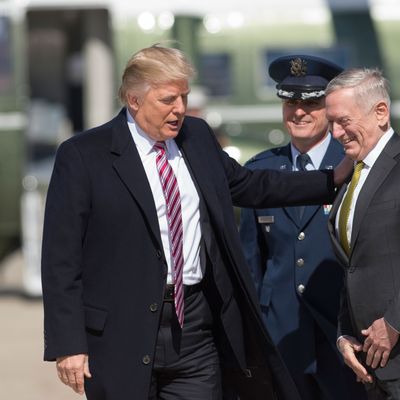
Last week, President Donald Trump unveiled his strategy for how his administration would fight the ongoing war against the Taliban and various other jihadist groups in Afghanistan. The good news and the bad news is that Trump himself will not be actively managing the U.S. participation in the Afghan conflict, but instead will give the Defense Department latitude to set troop levels and their level of engagement at its discretion, without interference from the White House.
It’s good news because Trump’s hands-off approach averts the risk of the president, an impulsive leader with no military experience, ordering a reckless escalation of the war for, say, PR purposes. Secretary of Defense James Mattis is perhaps the most intelligent, levelheaded, and mature member of the Trump administration (which is not to damn him with faint praise), and so far, intends to pursue the Afghan War as part of a regional strategy, in partnership with allies, and without dramatically increasing the number of American soldiers on the ground. Right now, he’s only talking about deploying another 2,000-to-4,000 troops on top of the 8,400 already there. In terms of risk to our tax dollars and American lives, that is not such a heavy price to pay if Mattis is indeed successful at finally routing the Taliban, Al Qaeda, and ISIS in Afghanistan.
Hawkish pundits like Eli Lake are praising Trump’s strategy for another reason: By declining to set a definite end date for the U.S. military engagement, it avoids the mistake critics of the Obama administration’s approach said the former president made in broadcasting to the Taliban and other terrorist organizations, as well as other regional malefactors like Russia, Iran, and Pakistan, exactly when it would be safe to gallivant around the Central Asian country again without the risk of running into an American soldier.
Now for the bad news. Mattis may be a grown-up but he is also a general, and giving a military leader carte blanche to handle a war as he sees fit, with little civilian oversight, certainly has its downsides. Lake notes that military commanders under Obama “complained that the White House at times micromanaged the war” and put restrictive limits on how much battle support our troops could provide to the Afghan soldiers they were there to train, but those restrictions were meant to avoid mission creep and a reescalation of our military role, as well as to ensure that our military kept the terms of the agreements we had signed with the Afghan government.
Letting the Pentagon decide for itself how to handle our presence there doesn’t necessarily guarantee an escalation, but it raises the possibility of military men deciding (as they are wont to do) that more aggressive military action is the key to breaking the current stalemate, and thus opening a can of worms that proves hard to close. As Lake’s Bloomberg View colleague Noah Feldman points out, “The fundamental drawback to this presidential outsourcing comes from the way it structures incentives over the long run.
Put simply, the Pentagon will always ask for more.” The Defense Department is not in the habit of saying it doesn’t need any more soldiers, weapons, or money, and Mattis certainly has no reason not to take as much as he can get for a war that looks no more decisively winnable today than it has for the past decade and a half we’ve been fighting it. In Feldman’s view, delegating authority for Afghanistan to Mattis lets Trump take credit for any victories and distance himself from any failures that might arise from the defense secretary’s efforts.
Furthermore, while setting no deadline for withdrawal may not give the Taliban a precise idea of when the U.S. will no longer be a factor in Afghanistan, they know full well that their strategy of wearing us down until we get fed up and leave is working and will eventually prevail. Smoking the Taliban out of their innumerable hiding places in the Af-Pak region is a thoroughly unrealistic proposition, and whether in two years, five, or ten, at some point, we will leave. Millenarian fanatics with their eyes on Armageddon and the afterlife will happily wait us out a little longer if need be. Foreign powers great and super have been failing badly to stamp out Afghan insurgencies for going on 180 years now; anyone who thinks a little strategic ambiguity will make them crack is kidding themselves.
In an op-ed in the Washington Examiner, Daniel L. Davis, a retired Army lieutenant colonel and a senior fellow at Defense Priorities, argues that Trump would be better off abandoning the pipe dream of defeating the Taliban and stabilizing Afghanistan militarily, which he describes as “a physical impossibility” given the country’s size and inhospitable terrain.
Instead, the president would be far wiser to focus on the goal of protecting the U.S. from terrorism by engaging in a robust diplomatic effort “to convince Pakistan to cease or severely curtail cross-border support for the insurgency.” According to Reuters, the administration is indeed weighing a strategy of coercive diplomacy to pressure Pakistan in just that regard, which may include an escalation of drone strikes there, withholding aid, or even downgrading our relations. On the other hand, the goal of getting Pakistan to clean up its act is one both the Obama administration and the Bush administration before it tried and failed to achieve, and it’s not immediately clear why Trump should be any more successful.
However that plan goes, we can be sure that getting out of Afghanistan for good and all is the one strategy America won’t try anytime soon, at least not as long as the public barely remembers we’re still there.





























